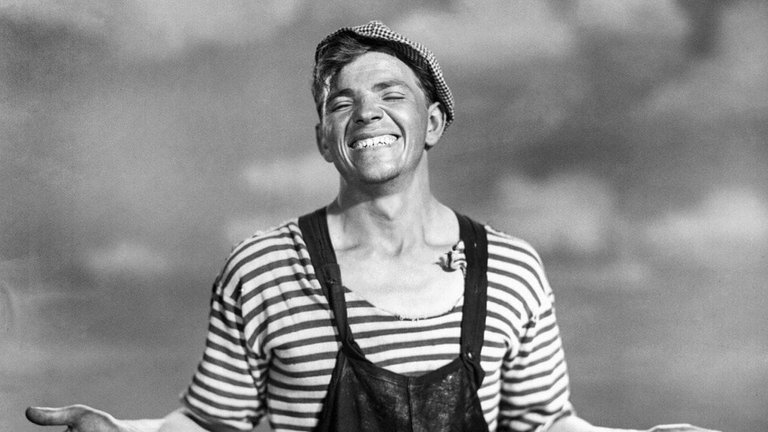Film Review: Tractor Drivers (Traktoristy, 1939)

In late 1930s, as the next world war was becoming increasingly likely, Soviet government has began with propaganda campaign to prepare its public for such eventuality. While most of that propaganda was crude, some of it rather subtle and came in such seemingly innocent forms like musical comedies. One of the best examples was Tractor Drivers, 1939 film directed by Ivan Piriyev.
Protagonist, played by Nikolai Kryuchkov, is Klim Yarko, recently demobilised Red Army soldier who is, together with two of his comrades, returning from service in Russian Far East. After seeing picture of Maryana Bazhan (played by Marina Ladynina), highly decorated leader of brigade of female tractor drivers in Ukraine, in Pravda newspaper he jokes that he would go to her. She has, thanks to the article, gained so many male admirers that she asks tractor driver Nazar Duma (played by Boris Andreyev) to act as her alleged fiance. By strange coincidence, Klim helps Maryana when she ends in a ditch with her motorcycle. As a sign of gratitude, she hosts him at her home and, later, when he continues his journey, talks him into staying at their machine tractor station and working as a tractor driver. Klim earns respect of Nazar and other drivers with his skills he has developed by driving tank in the army and wants to train his colleagues to drive tanks in case of war. Nazar is inspired to drive his tractor so successfully that Maryana decides to marry him, but at the last minute Klim confesses his feelings towards her.
Directed by Ivan Pyryev, film maker with reputation of the most successful author of Stalinist cinema, Tractor Drivers is a textbook example of Socialist Realism, official Soviet art doctrine. Rural setting, which allowed for relatively simple and undemanding plots, was very suitable for such films and it could be used much more effectively to present Soviet Union as advanced and prosperous country, without reminders of the old pre-revolutionary world that was harder to avoid in big cities. Ukrainian collective farms were also chosen as the setting of Tractor Drivers for another reason, which becomes apparent in the scene during which tractor drivers accidentally dig out Prussian helmet from the field. Machine tractor station manager Kirill Petrovich (played by Stepan Kayukov) explains that the helmet belonged to an officer of Imperial German Army, which had briefly occupied Ukraine at the end of First World War before being chased away by Red Army. He also claims that if the Germans invade, they would suffer the same fate. Those prophetic words addressed policy of Nazi Germany, whose leader Adolf Hitler had expressed conquest of eastern lands as his future goal in Mein Kampf, which was for that very reason considered main potential adversary by Soviets. The film also mentions Battle of Lake Hassan, major conflict with Japanese on Manchurian border which took place one year earlier. While reminding Soviet populace of external threats, Pyryev also signals that Soviet Union has moral and material resources to handle them thanks to the process of rapid industrialisation. That process is manifested through tractors, machines that symbolise new technological power, and it could be easily converted into tanks.
While Tractor Drivers functions as propaganda reasonably well, it leaves much to be desired as light entertainment, at least when compared with Hollywood films of the time. Pyryev lacks sophistication and innovativeness of Grigori Alexandrov, another grand author of Stalin era musical comedies. His film in strictly technical sense looks rough around the edges and the acting is at times too theatrical. Stepan Kayukov appears to be the only cast member who acts and looks like a truly comical character, and he even manages to upstage Marina Ladynina, director’s wife who actually became the greatest Soviet cinema star at the time. Some of the scenes, on the other hand, were directed well. What ultimately saves this film is music by Pokrass Brothers, which, together with lyricist Boris Laskin, brought two songs that would become part of Soviet popular culture. One was “Tri Tankista”, which retold Battle of Lake Hassan and another was “March of the Soviet Tankmen”. Like so many Soviet films from the Stalinist period, Tractor Drivers was subjected to censorship in post-Stalin years, with new version purging all references to Stalin and original becoming available only after the fall of Soviet Union. In 1991, as the Soviet Union was collapsing, a parodic remake Tractor Drivers 2, set in contemporary period, was directed by Gleb and Igor Aleynikov.
RATING: 5/10 (++)
Blog in Croatian https://draxblog.com
Blog in English https://draxreview.wordpress.com/
Leofinance blog https://leofinance.io/@drax.leo
Unstoppable Domains: https://unstoppabledomains.com/?ref=3fc23fc42c1b417
Hiveonboard: https://hiveonboard.com?ref=drax y
Bitcoin Lightning HIVE donations: https://v4v.app/v1/lnurlp/qrcode/drax
Rising Star game: https://www.risingstargame.com?referrer=drax
1Inch: https://1inch.exchange/#/r/0x83823d8CCB74F828148258BB4457642124b1328e
BTC donations: 1EWxiMiP6iiG9rger3NuUSd6HByaxQWafG
ETH donations: 0xB305F144323b99e6f8b1d66f5D7DE78B498C32A7

Congratulations @drax! You have completed the following achievement on the Hive blockchain And have been rewarded with New badge(s)
You can view your badges on your board and compare yourself to others in the Ranking
If you no longer want to receive notifications, reply to this comment with the word
STOPCheck out our last posts: